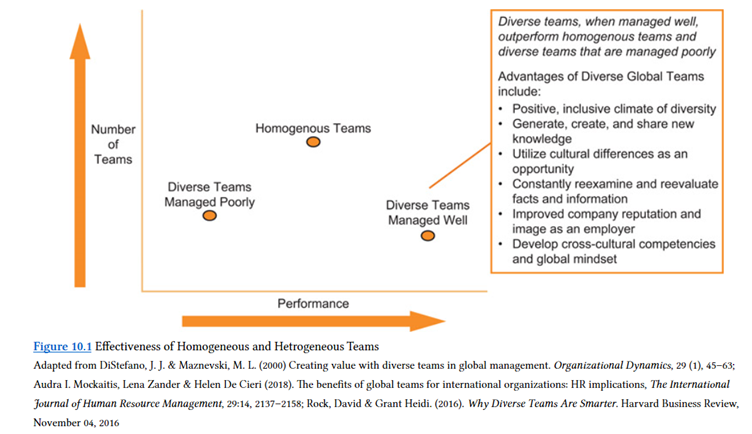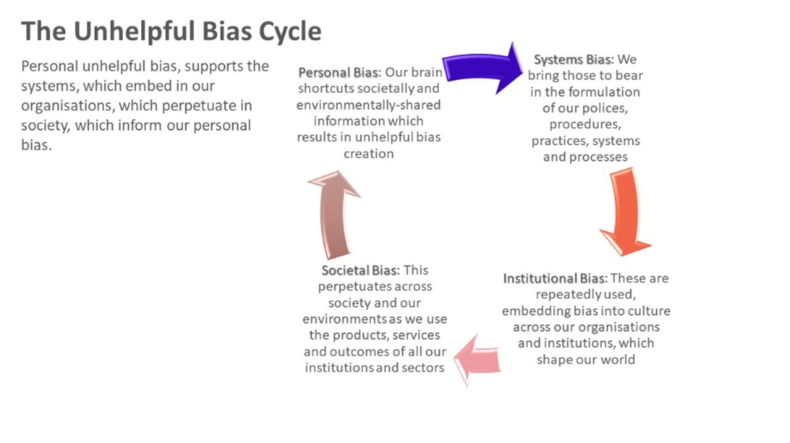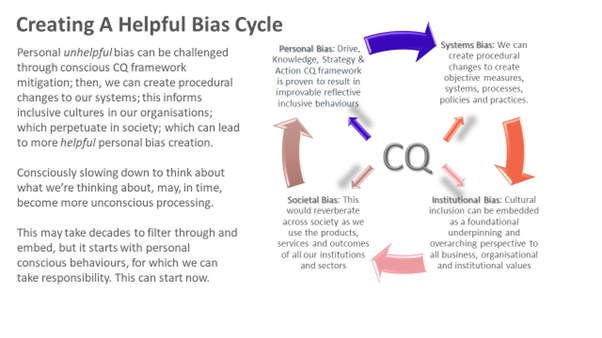Tags: Diversity
In 2020, the Institute put together a comprehensive report on how Diversity is ethical. It was absolutely right. The IBE guidance is useful in determining approaches to diversity, but more than this we need an inclusion approach which is holistic.
Research into the power of diverse teams in solving complex tasks by Professor Scott Page, who specialises in economics, political science and complex systems, evidences a “diversity bonus” where diverse groups almost always outperform homogenous groups. The diversity bonuses deliver improved problem solving, increased innovation and more accurate predictions. Page also found that, on complex tasks, the best performing team does not need to consist of the best individuals and a diverse group that displays different perspectives outperforms a group of non-diverse and like-minded experts.
– IBE guidance
The below chart is from International Human Resource Management: policies and practices for multinational enterprises [1]. The view has been around for some time that diverse teams underperform homogeneous teams where the team is poorly managed/there’s no inclusive culture.

Diverse teams only outperform when well-managed and part of an inclusive culture. It’s a very important distinction.
So, inclusion is the defining factor as to whether mixed teams in businesses perform well, not diversity. Crucially, just like ethics, this is a behavioural issue.
The main concern within equity, diversity and inclusion (EDI) efforts to date, is that the disparate initiatives have been targeting different identities for years, but structural issues which result in the underrepresentation of different backgrounds still persist.
Lack of diversity is an outcome when we don’t have inclusive cultures in our workplaces – something that is an obligation of leadership to cultivate and nurture.
What has this to do with Ethics? Inclusion is a matter of having a complete and comprehensive approach to treating all humans with respect, valuing differences and providing equality of access to opportunities – not to do this mindfully and purposefully, is unethical.
We are all biased. To be human is to be biased [2]. Not all bias is unconscious. Not all unconscious bias is unhelpful.
Be clear, though, that the shortcutting of information is a human biological cerebral need. We wouldn’t be able to function effectively if our brains didn’t have the capacity to make assumptions and create heuristics due to the sheer amount of information it has to process. However, due to repeated inputs, socialisation, cultural messaging etc, stereotypes and biased information work their way into our psyche, and they then play out in our behaviours.
Knowing that we are all biased, we have to break the cycle of our unhelpful biases, which then support our systems, which perpetuate in society, which then reinforce our bias, and we get stuck in a vicious circle and very little change. I have visualised this, thus:

This is the ethical imperative, to take responsibility for knowing this and then making the changes by creating procedural changes to mitigate the impact of unhelpful bias.
There is a behavioural framework which has been proven to assist with the creation of inclusive behaviours.
Cultural Intelligence (CQ) is the capability to work and relate effectively across differences, and when applied properly, research shows, that people think, communicate and act inclusively. It is also known as CQ, as Q stands for quotient – it’s a measure as well as an improvable skill.
Inclusion isn’t about other people and their identities, it’s about us and our behaviours. When we embed the CQ behaviours in an individual way, especially in leadership positions, this feeds into the creation, implementation and enforcement of better, more inclusive policies, procedures and practices, which then enhance the culture of an organisation. It’s an introspective piece of work, which can cause discomfort, but there is certainly a moral obligation to do it. By changing our own behaviours, we can effect real change because it is entirely within our own agency.

How do you develop your CQ? The two decades of peer-reviewed research has shown that you need four capabilities: Drive, Knowledge Strategy and Action.
I liken inclusion fitness to physical fitness.
Imagine you are not particularly fit, but everyone is telling you being fit is the thing to do and you decide, ok, I’ll give it a go; you’re going to start with a ‘Couch to 5K’.
Firstly, you have to want to get up off that couch. Are you motivated to get out that door? But do you want to? Being driven to make the change starts with your motivations. And if you’re not motivated, how do you motivate yourself?
Next, what do you need to know? About your body, about any equipment – can you run in your Converse shoes? What about in a bikini? A combination of the two perhaps? (This is a blog on inclusion, I’m not judging). Who are you asking about what you should do? Where are you getting your information? That twinge in your left hip, is it ok to run with that? What stretches do you need to do?
When you have the information you need, you then might look at your diary; darn, coffee with neighbours on Thursday and doing shopping for mum on Saturday, Friday - yep, you can step out the door then. You’re feeling ok in yourself, and you’ve checked off all your prep.
Friday rolls around and you do it, you go for your first jog at a pace that suits you. Constantly thinking about what might make it better. Maybe a soundtrack? Or, not when it’s raining. Or, actually, you’ve prepared perfectly. Or, it’s all gone horribly wrong, and you must start again.
What I’ve described here is similar to the first steps to developing your cultural intelligence:
CQ Drive is your level of interest, persistence, and confidence in working & relating with others. (Do you want to get up off the couch?)
CQ Knowledge is your understanding about how cultures are similar and different. (What do you need to know?)
CQ Strategy is your awareness and ability to plan for working & relating with others. (Have you checked your diary and are you feeling ok?)
CQ Action is your ability to adapt when relating and working with others. (Going for the run.)
Being ethical in business requires leadership to take on the mantle of role-modelling inclusive behaviours, using a clear bias-mitigating model like CQ, and forging a different more successful way forward in forging inclusive cultures where diversity can thrive.
[1] Ibraiz Tarique, Dennis R. Briscoe and Randall S. Schuler. Description: 6th edition. Abingdon, Oxon; New York, NY: Routledge, 2022.
[2] Stranger to Ourselves, Discovering the Adaptive Unconscious, Timothy Wilson; Thinking, Fast and Slow, Daniel Kahneman; Sway, Unravelling Unconscious Bias, Pragya Agarwal and others.
Author

Marsha Ramroop
Marsha was appointed to the Advisory Council in July 2023.
Marsha Ramroop FRSA FIEDP is a global award-winning Equity, Diversity and Inclusion (EDI) strategist, and Founder Director of Unheard Voice Consultancy Ltd. She has formulated a culture change methodology which has been recognised as successful with an international prize from
the UN-backed conglomerate of best practice for personal and organisational development, the IFTDO, and with Brandon Hall HRD Gold Medals.
She was the inaugural Director of Inclusion and Diversity at the Royal Institute of British Architects (RIBA). Her culture change programme for staff at RIBA received 100% recommendation feedback from managers and significant behavioural shift within months.
Routledge will be publishing Marsha’s Practical Guide to EDI for Architecture and the Built Environment, due in Autumn 2024.
She also works with the Cultural Intelligence Center, the global headquarters of cultural intelligence (CQ) as one of their published and highlighted thought-leaders on impactful organisational change, as well as a worldwide trainer and facilitator.
Before working full-time in inclusion, she had a 30-year career in broadcasting, 20 years of which was at the BBC.
Marsha is also a Fellow of the Institute of Equality and Diversity Professionals (FIEDP), an institute which strives to verify and set standards for the growing vocation of EDI practitioners. She’s a Life Fellow of the Royal Society of the Arts (FRSA).
Marsha was appointed to the Advisory Council in July 2023.
Marsha Ramroop FRSA FIEDP is a global award-winning Equity, Diversity and Inclusion (EDI) strategist, and Founder Director of Unheard Voice Consultancy Ltd. She has formulated a culture change methodology which has been recognised as successful with an international prize from
the UN-backed conglomerate of best practice for personal and organisational development, the IFTDO, and with Brandon Hall HRD Gold Medals.
She was the inaugural Director of Inclusion and Diversity at the Royal Institute of British Architects (RIBA). Her culture change programme for staff at RIBA received 100% recommendation feedback from managers and significant behavioural shift within months.
Routledge will be publishing Marsha’s Practical Guide to EDI for Architecture and the Built Environment, due in Autumn 2024.
She also works with the Cultural Intelligence Center, the global headquarters of cultural intelligence (CQ) as one of their published and highlighted thought-leaders on impactful organisational change, as well as a worldwide trainer and facilitator.
Before working full-time in inclusion, she had a 30-year career in broadcasting, 20 years of which was at the BBC.
Marsha is also a Fellow of the Institute of Equality and Diversity Professionals (FIEDP), an institute which strives to verify and set standards for the growing vocation of EDI practitioners. She’s a Life Fellow of the Royal Society of the Arts (FRSA).
